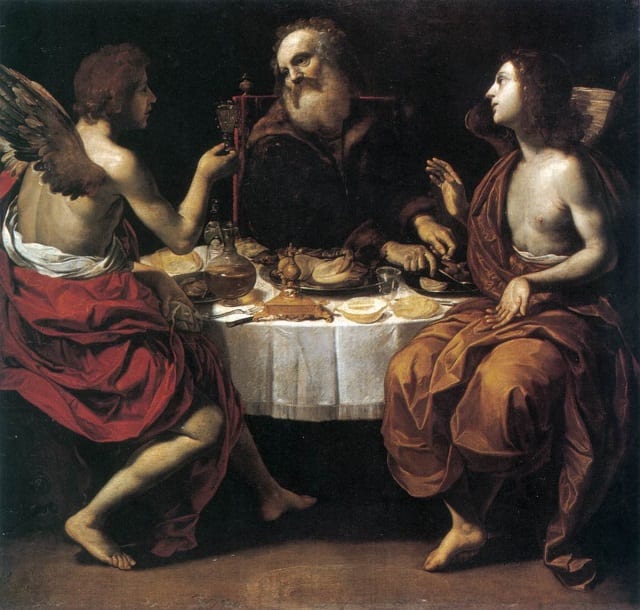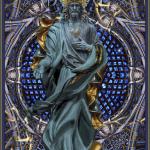
This is a reply to Matt Slick: Presbyterian pastor and head of the large and influential anti-Catholic Protestant CARM discussion forum. I am responding to his article, “Is praying to the saints biblical?” His words will be in blue.
*****
One of the erroneous teachings of the Roman Catholic Church is the doctrine of praying to the saints. Catholicism teaches that it is okay to offer prayers not only to God but also to creatures such as Mary, Joseph, and others who have entered heaven. Is it biblical to pray to anyone other than God? We firmly hold that it is not biblical and that to pray to anyone other than God is idolatrous. . . .
There is no biblical teaching at all that states we are to pray to those who once were alive on earth and are now in heaven. . . .
Worship includes prayer. Therefore, no one should pray to any created thing.
Biblically, prayer is always offered to God and is a form of worship. All religions view prayer as an act of worship to their god(s) since they contain petitions, confession of sin, requests of intercession, etc.,–things which are received and answered by God and not by created things. Also, prayer is not the same thing as talking to someone face-to-face. Prayer is a humble petition to the Lord and not to a friend who’s in the same room with you or on the other end of the phone–or in heaven. Prayer is offered to God–never to any created thing. To do so is to offer worship that should only be directed to God, which is idolatry. Prayer should be offered only to God, and the Roman Catholic Church needs to repent of its false and idolatrous practice of praying to the saints.
That’s odd. Pastor Slick must read a different Bible than I do. Jesus’ story (not technically a parable, because they don;t have proper names) of Lazarus and the rich man (traditionally known as “Dives”) is found in Luke 16:19-31. It’s a remarkable argument for the Catholic belief in invocation of saints and asking saints to intercede. And it goes directly against Protestantism, which strongly upholds the following two propositions:
- It is improper to “pray” to anyone but God, and
- It is improper to ask anyone but God to fulfill (i.e., have the power and ability to bring about) an intercessory request. By definition, no one but God can do so.
These are exactly the sorts of considerations concerning which the Luke 16 passage is relevant. The rich man literally prays to Abraham in the passage and asks him to send someone to warn his five brothers, so they can repent and not end up in his miserable state (on the “bad” side of the two divisions in Hades described in the passage). Here is the entire passage:
Luke 16:19-31 (RSV) “There was a rich man, who was clothed in purple and fine linen and who feasted sumptuously every day. [20] And at his gate lay a poor man named Laz’arus, full of sores, [21] who desired to be fed with what fell from the rich man’s table; moreover the dogs came and licked his sores. [22] The poor man died and was carried by the angels to Abraham’s bosom. The rich man also died and was buried; [23] and in Hades, being in torment, he lifted up his eyes, and saw Abraham far off and Laz’arus in his bosom. [24] And he called out, `Father Abraham, have mercy upon me, and send Laz’arus to dip the end of his finger in water and cool my tongue; for I am in anguish in this flame.’ [25] But Abraham said, `Son, remember that you in your lifetime received your good things, and Laz’arus in like manner evil things; but now he is comforted here, and you are in anguish. [26] And besides all this, between us and you a great chasm has been fixed, in order that those who would pass from here to you may not be able, and none may cross from there to us.’ [27] And he said, `Then I beg you, father, to send him to my father’s house, [28] for I have five brothers, so that he may warn them, lest they also come into this place of torment.’ [29] But Abraham said, `They have Moses and the prophets; let them hear them.’ [30] And he said, `No, father Abraham; but if some one goes to them from the dead, they will repent.’ [31] He said to him, `If they do not hear Moses and the prophets, neither will they be convinced if some one should rise from the dead.'”
It matters not if both men are dead; the rich man still can’t do what he did, according to Protestant categories of thought and theology. And how is it that the rich man prays to Abraham, when supposedly no one can pray to or ask to fulfill a request to anyone but God? The rich man actually makes two such requests, and then repeats the second, after Abraham refused it:
- Luke 16:24 And he called out, `Father Abraham, have mercy upon me, and send Laz’arus to dip the end of his finger in water and cool my tongue; for I am in anguish in this flame.’
- Luke 16:27-28 And he said, `Then I beg you, father, to send him to my father’s house, for I have five brothers, so that he may warn them, lest they also come into this place of torment.’
- Luke 16:30 And he said, `No, father Abraham; but if some one goes to them from the dead, they will repent.’
How can that be within Protestant theology? No one has ever adequately explained this to me, and I’ve written about this passage many times on my blog and in my books. Abraham appears in the story to be able to fulfill prayer requests by his own powers. Why is the whole story about Dives asking Abraham for requests, rather than going directly to God and asking Him? God is never even mentioned in the entire story (!). Because it’s not a parable, Abraham doesn’t represent God (no one represents anybody); he is literally the same Abraham of the Old Testament.
This just isn’t how it’s supposed to be, from a Protestant perspective, and Pastor Slick’s specific (rather typical) argument above. All the emphases are wrong, and there are serious theological errors, committed by Jesus Himself (i.e., from their perspective). It creates huge problems for Protestant theology and biblical inspiration alike; even for Christology (if Jesus Himself is dead wrong about something so central to faith as prayer).
Nor is this the only instance of biblically and God-sanctioned prayer to the dead, or (more specifically) asking them to intercede:
1 Samuel 28:15-16 Then Samuel said to Saul, “Why have you disturbed me by bringing me up?” Saul answered, “I am in great distress; for the Philistines are warring against me, and God has turned away from me and answers me no more, either by prophets or by dreams; therefore I have summoned you to tell me what I shall do.” And Samuel said, “Why then do you ask me, since the LORD has turned from you and become your enemy?”
The principle / scenario here is the same as in the rich man Dives praying to Abraham, above: Samuel could properly be petitioned or, in effect, “prayed to” but he also could refuse the request, and he did so. As Samuel explained, he didn’t question the asking as wrong and sinful, but rather, refused because the request to save Saul was against God’s expressed will: which Samuel also knew about, as a departed saint. Moreover, Samuel knew (after his death) that Saul was to be defeated in battle the next day and would die (1 Sam 28:18-19).
And there is a third biblical proof:
Matthew 27:46-50 And about the ninth hour Jesus cried with a loud voice, “Eli, Eli, la’ma sabach-tha’ni?” that is, “My God, my God, why hast thou forsaken me?” [47] And some of the bystanders hearing it said, “This man is calling Eli’jah.” [48] And one of them at once ran and took a sponge, filled it with vinegar, and put it on a reed, and gave it to him to drink. [49] But the others said, “Wait, let us see whether Eli’jah will come to save him.” [50] And Jesus cried again with a loud voice and yielded up his spirit. (cf. Mk 15:34-36)
The “bystanders” are presented as allies of Jesus, since one of them gave Him a drink, in the next verse (Matthew 27:48). The next verse (27:49) again shows that this was common belief at the time: “But the others said, ‘Wait, let us see whether Eli’jah will come to save him.’”
Thus, it was believed that one could pray to a dead person such as Elijah (who had already appeared with Jesus at the transfiguration), and that he had power to come and give aid; to “save” a person (in this case, Jesus from a horrible death). It’s not presented as if they are wrong, and in light of other related Scriptures it is more likely that they are correct in thinking that this was a permitted scenario.
Jesus, after all , had already referred to Elijah, saying that he was the prototype for John the Baptist (Mt 11:14; 17:10-13; cf. Lk 1:17 from the angel Gabriel), and it could also have been known that Elijah and Moses appeared with Jesus at the transfiguration (Mt 17:1-6), if these were His followers.
Angels are also creatures, and the Bible shows us that they can be prayed to, and answer prayer, as well. In the Old Testament, Lot makes such a request of two angels, who were sent by God to destroy Sodom and Gomorrah (Gen 19:13):
Genesis 19:20 “Behold, yonder city is near enough to flee to, and it is a little one. Let me escape there . . . and my life will be saved!”
One of them grants his “prayer” (19:21): “Behold, I grant you this favor also, that I will not overthrow the city of which you have spoken.” Someone might say, “but the angel wasn’t in heaven.” Location makes no difference: the angel still fulfilled an intercessory request. Angels can talk to us from heaven. For example:
Genesis 21:17-18 And God heard the voice of the lad; and the angel of God called to Hagar from heaven, and said to her, “What troubles you, Hagar? Fear not; for God has heard the voice of the lad where he is. [18] Arise, lift up the lad, and hold him fast with your hand; for I will make him a great nation.”
And we know that angels pray to God for us:
Zechariah 1:12-13 Then the angel of the LORD said, `O LORD of hosts, how long wilt thou have no mercy on Jerusalem and the cities of Judah, against which thou hast had indignation these seventy years?’ [13] And the LORD answered gracious and comforting words to the angel who talked with me. (cf. Rev 8:3-4)
When Jacob wrestled with the angel (Gen 32:24-29), he asked him to bless him (32:26), and the angel did so (32:29). Moreover, when Jacob (Israel) blessed his sons Joseph and Manasseh, he not only asked God to bless them, but also an angel (“the angel who has redeemed me from all evil, bless the lads”: Gen 48:16).
These four express biblical proofs present a host of problems for the stated position of Pastor Slick, above: which is the standard Protestant position for virtually all except for high Church Anglicans or Anglo-Catholics. He not only said that no one could or should be prayed to but God, and certainly not dead men and saints (which the above passages decisively refute); he also claimed that such prayer or petition is part and parcel of worship, and that to do this to anyone besides God is, therefore, “not biblical” and “idolatrous.”
But it’s not worship, anymore than our asking others on earth to pray for us is worship. So Pastor Slick is in a very uncomfortable position of having to explain the above passages and synthesize them with his false tradition of men. If we can’t and ought not pray to anyone but God, why does Jesus Himself teach that Abraham could be prayed to?
Why does the Old Testament teach that the dead prophet Samuel could be prayed to and petitioned by King Saul? Why does the New Testament not rebuke the reported opinion that Jesus might have been calling to (praying to) the prophet Elijah from the cross? And why does Lot pray to an angel and even get a request fulfilled by the angel?
Moreover, Pastor Slick argues: “prayer . . . contain[s] petitions, . . . requests of intercession, etc.,–things which are received and answered by God and not by created things.” Really? This is simply untrue as well. We have seen that both Abraham (as taught and sanctioned by Jesus) and Samuel received petitionary or intercessory requests after they were dead, and did not rebuke the askers for requesting them (as they would have to do if Pastor Slick were right, just as creatures refused worship (Slick himself gave the example of this in Revelation 19:10, in his article).
And we saw how the notion of Jesus asking Elijah for help was commonplace and also not rebuked as wrong by the author of the Gospel of Matthew. Lot not only made a request of an angel, but received an answer. So Pastor Slick’s additional assertion is also false.
***
Photo credit: Lot Entertaining the Two Angels, by Rutilio Manetti (1571-1639) [public domain / Web Gallery of Art]
***













